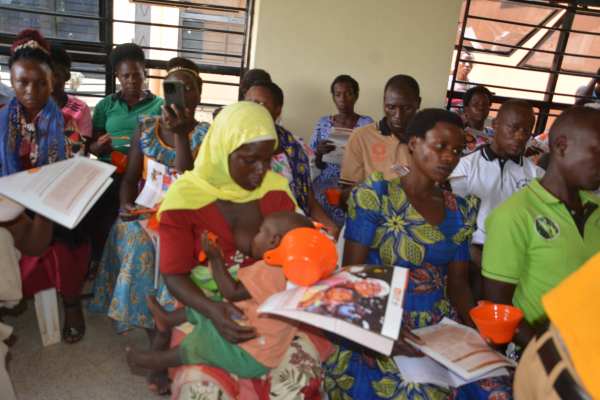KIKUUBE, September 29, 2025 — Farmers under various cooperative societies in the refugee host communities in Kikuube District are partnering with the Association for Strengthening Agriculture Research in Eastern and Central Africa [ASERECA] to promote the production of biofortified crops.
Biofortified foods are foods enriched with Vitamin A, iron and zinc which are essential micronutrients with distinct roles in health, such as supporting the immune system, vision, skin, and growth.
ASERECA, with a funding from European Union, corroborating with the Agriculture ministry, Makerere University, National Agricultural Research Organisation [NARO], and International Potato Centre [CIP] among others on Tuesday held a training of over 200 beneficiaries in Kyangwali Trading Centre in Kyangwali Subcounty, on the importance of eating biofortified food.
The beneficiaries were selected from Buhumuriro Tukorerehamwe Farmers’ Cooperative Society Limited, Kyeya Farmers Group, Kikora Farmers Organisation, Agabagaya Farmers’ Cooperative Society Limited and Mburara Farmers Group among others located in the refugee host sub-counties such as Kyangwali, Kabwoya and Kiziranfumbi.
After the training, ASERECA supported the farmers with planting materials of biofortified crops such as orange fleshed sweet potato and NAROBEAN 1 to RARO BEAN7.
Dr Noman Kwikiriza an officer at CIP) said that biofortified crops such fleshed sweet potato is enriched with Vitamin A which is important for pregnant and lactating mother and brain, eye sight, Immunity, development and growth of children between six to 23 months.
He noted that the campaign was initiated following the Vitamin A deficiency burden among children and mothers both in Uganda and globally. According to him, between Shs 250,000 to Shs 500,000 children with Vitamin A deficiency turn blind every year adding that the number of children dying from Vitamin A deficiency is estimated to be 221, 430 by 2025 globally.
“Vitamin A is very important to very ones, especially children between six to 23 month, pregnant and lactating mother, they really need it because we have what we call 1000 days, these are the periods where child is the womb up to their two years, those are critical years that the child will need nutrition. God help us that we can find this Vitamin A in these sweet potatoes, very easy to grow, we have always eaten them but now having orange fleshed sweet potatoes helps so Much because very farmers whether poor or rich you can grow them and even in the small area because one need is a medium size of sweet potato of about 25grams,” he said.
Dr Immaculate Mugisa a senior research officer and bean breeder at National Agricultural Research Organization (NARO) also said that biofortified NAROBEAN 1 to RARO BEAN7) is rich in Iron and zinc adding that the beans have over 20 percent iron than the ordinary beans.
She underscored a need to promote the production and eating of these beans to address the challenges of Iron deficiency anemia among children and mothers.
She noted 50 percent of children of age six to five year in Uganda are suffering from Iron deficiency anemia while over 30 percent of women in reproductive age are suffering from Iron deficiency anemia.
“Statistic indicates that we have high percentage of children and women in productive age are suffering from Iron deficiency anemia, this is the reason why pregnant mother go to hospital and they give them iron tablets, so if the Ugandan community consumes these beans more it will help us to reduce on the number of people who are suffering from Iron deficiency anemia” she said and called for promotion of these beans.
Joshua Okonya, the Programme officer Agriculture Technology and Innovation at ASERECA said they are targeting refugee areas because there is high prevalence of Vitamin A deficiency [malnutrition] among the children and mothers.
He noted that prevalence of Vitamin A deficiency in refugee areas of Kikuube is between six and nine percent adding this has a negative impact on child growth and development. “We have started our trainings and giving support to refugee host communities because they have land and if they embrace production of biofortified crops, they will get food for their home and sell their surplus to the refuges” he said adding that after empowering the host community, the organisation will roll out their campaigns to the refugee community.”
David Tumwesige Senior Agriculture officer in charge of Nutrition at the Ministry of Agriculture said that the initiative is going to contribute to the government effort in promoting food and nutrition security.
“In bid to fight against Malnutrition and diseases, the government through NARO, saw it important to add these micronutrients to the stable foods since they can be accessed by every family” he said and called on the public to embrace growing and consumption of biofortified foods.
Josephat Friday, Chairperson of Buhumuriro Tukorerehamwe Farmers’ Cooperative Society Limited expressed excitement about the initiative saying it is going to help the farmers to produce foods that will help their families to have good health.
https://thecooperator.news/kikuube-coop-managers-urged-to-uphold-good-governance-practices/
Buy your copy of thecooperator magazine from one of our country-wide vending points or an e-copy on emag.thecooperator.news
